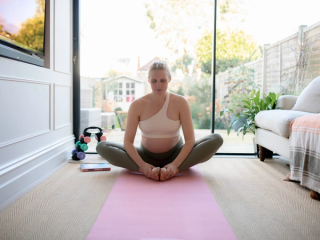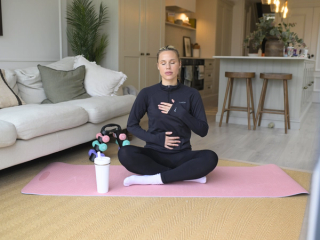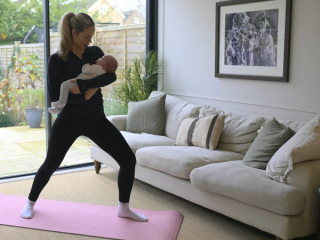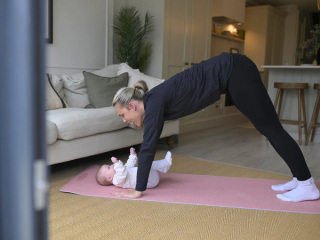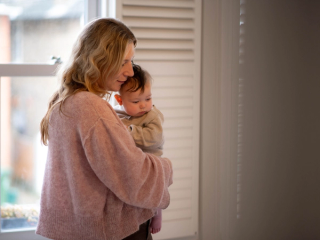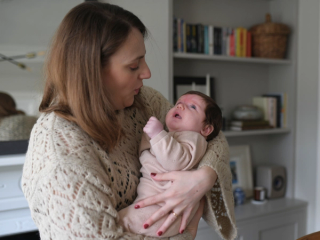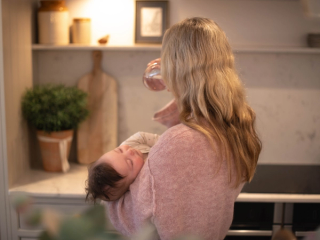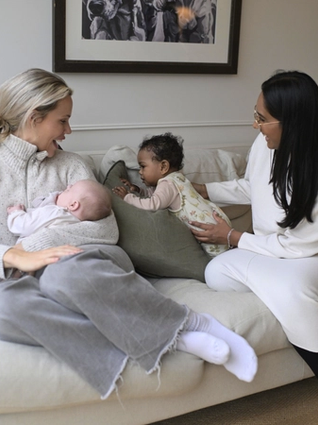
- Home
- Advice Hub
- Newborn
- Postnatal Care
- Postnatal Care And Support For Mothers
Postnatal Care and Support for Mothers
The weeks after your baby arrives are wonderful & exhausting. Don't feel ashamed to ask for help! Find out where you can find support at HiPP now.
Reviewed by Christine Lane, Midwife & Consultant, on 24.09.2025.
New parenthood can feel very scary. Suddenly you’re out in the world with a baby and – possibly – absolutely no idea what you’re doing. While many new mothers have a great support network in their family and friends, some people find themselves more isolated than ever before. Cut off from work, grappling with a new identity, and responsible for a tiny person who is unable to articulate their wants and needs – it’s all so overwhelming.
But you don’t have to go through it alone. There are ways to build the support network you need, and it's worth considering before the baby is born what kind of help you might be looking for.
Taking advantage of the services available might give you the boost you need to get through the sleepless nights and feel more confident in your parenting.
Examples of support for Postnatal mothers
Postnatal Doulas
Doula is a Greek word meaning “caregiver,” and a postnatal doula's mission is to support the whole family for the first few weeks of your baby's life. A postnatal doula will visit your home for around 3 or 4 hours per day (or every other day) for up to 6 weeks, depending on your contract. They will offer both emotional and practical support and help take care of your newborn so that you can get some much-needed rest.
A postnatal doula might help with:
- Laundry
- Cooking
- General tidying
- Caring for other children
Postnatal doulas can help support breastfeeding or refer you to a specialist support person if you need one. A postnatal doula will also be able to teach you about bottle feeding safety and hygiene.
Maternity nurses
A maternity nurse can either live in your home and be on duty 24 hours a day, 5 or 6 days a week, or work 8 – 12 hour shifts (days or nights). Most maternity nurses are very experienced nannies, children’s nurses or midwives; they will be able to support you in breast or bottle feeding and advise on all aspects of baby care.
Advantages of a maternity nurse:
- More recovery time (and more sleep!) right after your baby is born
- More help about the home
- An experienced person at hand if you're nervous or have questions
- An extra pair of hands to help care for twins or triplets
Disadvantages:
- The cost – this tends to be an expensive option
- Loss of privacy at a very special time
Sleep nannies & night nurses
Some night nurses will simply come into your home and take over for the night, giving you and your partner a chance to get a good unbroken night’s sleep.
However some sleep nannies/night nurses can help with all aspects of baby care and may be something you’re interested in looking into outside of the newborn months if sleep continues to be hard to come by. Things they might help with include:
- Guiding your newborn into a good sleeping and feeding routine
- Teaching older babies (over 6 months) how to sleep through the night
- Breastfeeding counselling
- Advice on how to deal with issues like colic and teething
Night nurses are highly experienced and will often be qualified midwives, children’s nurses, health visitors or nannies.
Peer Support Groups
If none of these services fall within your budget, or if you’re not comfortable having someone in your home, a very good – and often free – option for informal postnatal support is the peer support group.
Peer support is exactly what it sounds like – support from people going through the same thing as you’re experiencing. These groups might be run by local volunteers, or led by health visitors, breastfeeding coaches, or mental health support services. They might offer helplines or in-person meetings, depending on what is available in your area. If you’re looking for general support, you can usually find information about local groups on Facebook. These groups can be a godsend when you feel like you’re going through it all alone – and are also a great place to find new friends.
If you need specific support – for example, with breastfeeding, mental health, colic, etc. – you might need to find a more targeted organisation, such as one of those listed below.
Seeking support is an act of love, for you and your baby – not an admission of failure. Meeting other parents who are experiencing the same challenges as you will help you see that your struggles are normal – and may help you discover ways to improve whatever situation you find yourself in. There’s no shame in putting your hand up and asking for help. Isn’t it what you’d encourage your friends to do, if they were telling you their woes?
And though in your darkest hours you may be convinced that there’s no one and nothing that can help you – sleep deprivation will do that to a person! – just being with others, making yourself get dressed and leave the house, and putting one foot in front of the other will have a positive impact on your mental health.
A list of support groups for new parents
Action on Postpartum Psychosis (APP)
Information and support for anyone affected by postpartum psychosis.
Anxiety UK
03444 775 774 (helpline)
07537 416 905 (text)
Advice and support for people living with anxiety.
The Association for Post Natal Illness
020 7386 0868
Support for women experiencing postnatal depression.
Birth Trauma Association
Support for anyone affected by birth trauma, including partners.
Bliss
hello@bliss.org.uk
Information and support for parents of babies born premature or sick.
The Breastfeeding Network
0300 100 0212
Support and information about breastfeeding and perinatal mental health.
Cry-sis
0800 448 0737
Information and support for parents with crying and sleepless babies.
Family Action
0808 802 6666
Supports families of any kind, including with mental health problems.
Family Lives
0808 800 2222
Information and support for parents and families.
Gingerbread
0808 802 0925
Advice and practical support for single parent families.
Home-Start
Support for families with young children, including details of local services.
National Childbirth Trust (NCT)
0300 330 0700
Information, support and classes for parents.
No Panic
0300 7729844
Provides a helpline, step-by-step programmes, and support for people with anxiety disorders.
PANDAS Foundation
0808 1961 776
Information and support for parents and families experiencing a mental health problem during or after pregnancy.
Pink Parents
Information for gay and lesbian parents.
Tommy's
Information and support for people affected by stillbirth, miscarriage and premature birth.
Twins Trust
0800 138 0509
Information and support for parents of twins, triplets and multiple births.
Do you need additional mental health support?
Every new parent has bad days, but if every day is a bad day then you should talk to your GP. You might be suffering from postnatal depression – a common condition that affects one in 10 mums in the first year of their baby’s life. Postnatal depression can be serious, but it is also treatable, so the sooner you talk to your healthcare professional, the sooner they will be able to provide the support you need. You can read more about postnatal depression here <link to HiPP article> and find support via the NHShere.
Important Notice
We recognise that breastfeeding is best, providing many benefits to both mothers and infants. We also recognise that every parenting journey is unique, and we are here to support you through this journey, however you choose to feed your baby.
If you choose to breastfeed it is important that you eat a healthy well-balanced diet in preparation for and during breastfeeding. Before deciding to combination or formula feed your baby, note that reducing or stopping breastfeeding can be difficult to reverse. Babies feed on demand, so replacing breastfeeding with infant formula milk may reduce your supply. Formula feeding has both social and financial implications. Talk to your midwife or health visitor for guidance and support.
If you choose to use formula milk, make sure you choose the right milk for your baby’s age and prepare and store it according to the instructions on the packaging. Not doing so may make your baby ill. Infant formula is a nutritionally complete breastmilk substitute that can be used from birth. From 6 months you can choose to use follow on milk as part of a mixed diet and from 12 months you have the option to move onto growing up milk alongside a balanced diet.




